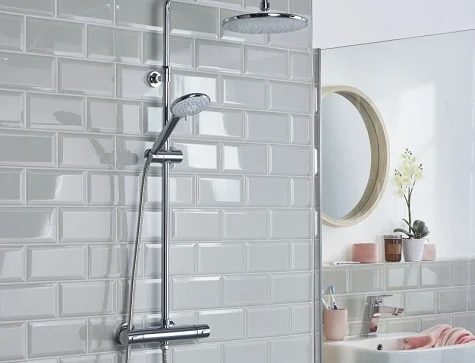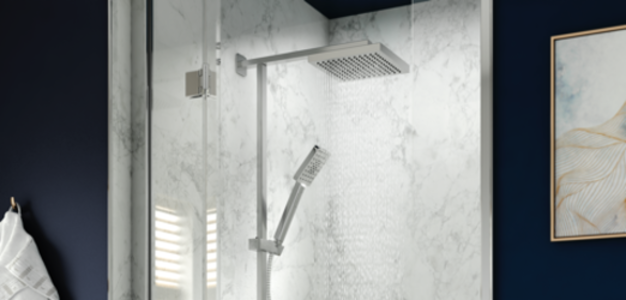 Free delivery on orders over £75 ex VAT
Free delivery on orders over £75 ex VAT Free click & collect from branches nationwide
Free click & collect from branches nationwideThe Ultimate Shower Buying Guide
Showers. They have the power to make you think like Aristotle, sing like Adele, and dance like nobody’s watching.
No matter what you do when you’re in them, showers are an essential part of daily life - so having the right one makes all the difference.
This shower buying guide will help you choose the perfect shower type for your bathroom, as well as provide you with an overview of the things you’ll need to consider when buying a new shower.
Choosing the best position for your shower
The first thing to consider when buying a new shower is the layout and size of your bathroom, and how your shower enclosure is going to fit in it.
If the new shower is going to be installed in a different position to where it was originally, keep in mind that even a small position change can consume a lot of time, effort, and funding.
Ensure you’re meticulous with measurements, and keep dimensions in mind when buying a new shower enclosure.
How strong is your water pressure?
The water pressure in your home will determine how powerful the flow of your shower will be, and therefore the type of shower you’ll need. If you don’t know your water pressure rate, it may be worth calling in a professional who can check for you.
Your water system will also have an impact on your water pressure, and therefore the type of shower you should buy:
1. Combi boiler water system
A combi boiler water system is designed to heat the water as you use it, rather than use a water cylinder or tank. They typically provide the highest water pressure, and can be used with virtually any type of shower.

2. Gravity fed water system
Gravity fed water systems are relatively common, especially in older houses. They work by utilising a tank in the loft filled with cold water, and a water cylinder in a cupboard elsewhere in the house. Gravity fed systems are typically associated with low pressure, however a shower pump can easily rectify this.
3. Unvented water system
Unvented systems supply large amounts of hot water via immersion heaters or high-pressure boilers. The pressure of these systems varies greatly, so it’s worth testing water pressure if you have one of these systems.
Choosing the right type of shower
1. Mixer Showers – Mixer showers are the simplest, most cost-effective type of shower available. They mix existing hot and cold water supplies together, and are relatively easy to fit. Keep in mind that mixer showers will have a weaker flow if your water pressure is low.
2. Electric Showers – Electric showers are similar to mixer showers; except they have their own electric heating element – so only a cold water supply is needed. Electric showers are an ideal solution for showers in ensuites, outhouses, etc. and they can be more economical than other types of shower.
3. Power Showers – Similar in appearance to electric showers, power showers draw from both hot and cold water supplies. The ‘power’ in power shower comes from an integrated pump, which boosts pressure for a more substantial water flow.
4. Digital Showers – If you’re looking for the ultimate showering experience, look no further. Digital showers allow users to set a precise temperature, ensuring their shower is always perfect – no more dipping a toe in only to discover the water is hot enough to boil an egg. Some digital showers can be controlled remotely, from a smartphone or remote control.

Picking the right shower valve
Showers require a valve in order to be controlled, and come in two variations: a thermostatic shower valve, or a pressure balance valve.
Most showers come with one of these valves pre-fitted; although the valves are interchangeable.
1. Thermostatic Valve - Has two handles, one that controls the water temperature and another that controls the power of the water. Thermostatic valves are ideal for maintaining a constant water temperature whilst you change the flow of the water. Thermostatic valves provide more control, and can prevent scalding - yet tend to cost more.

2. Pressure Balance Valve – Has a single handle that controls both the power and the temperature of the water. Pressure balance valves are typically the cheaper option.
The Shower Power of Power Showers
Power showers are a common choice that can help offset low water pressure. Yet if you’re buying a power shower, it’s important you pick the right one for your needs.
If your house has a small water tank or an unpredictable water supply, a lower kW (7 to 8.5kW) will suit you best. These require less power, and therefore provide less flow – meaning your shower is far less likely to run cold on you after 3 minutes.
Those with more modern boiler systems can opt for a lower powered shower, if they don’t mind the reduced flow. Lower power showers are generally cheaper to buy and run.
Higher powered models (8.5 to 11kW) provide a greater flow of water, which results in a super luxurious shower experience.
Not only does the extra pressure feel great, it’s also perfect for those with thick hair, as the sheer pressure can get all the shampoo / conditioner out quickly!
City Plumbing stocks everything you need to create your dream bathroom, including all kinds of showers and shower accessories.
For inspiration and guidance on the styling of your bathroom, including choosing the right showerheads, fittings, and layouts – you can click here to find the ideal look for your bathroom.
Looking for further support and advice about buying the right shower for your bathroom? Feel free to get in touch with our experts by clicking here.